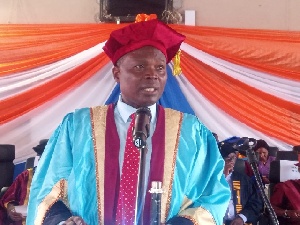- Home - News
- Elections 2024
- News Archive
- Crime & Punishment
- Politics
- Regional
- Editorial
- Health
- Ghanaians Abroad
- Tabloid
- Africa
- Religion
- Photo Archives
- Press Release
General News of Tuesday, 20 May 2025
Source: www.ghanawebbers.com
BTU: Lecturers turning vehicles to makeshift offices amid severe infrastructure deficit
Bolgatanga Technical University (BTU) is the only technical university in Ghana's Upper East Region. However, it faces a serious infrastructure deficit that affects teaching and learning.
During the 13th congregation ceremony, Vice-Chancellor Prof. Samuel E. Alnaa discussed these challenges. He noted that there are not enough lecture halls or office spaces. Some lecturers even use their cars and motorbikes as makeshift offices.
"The university lacks sufficient lecture rooms and office space," said Prof. Alnaa. "This limits effective teaching, as students compete for space." He urged the government to quickly build more lecture halls for the university.
The Vice-Chancellor mentioned that these infrastructure issues have existed since 2017. Successive governments have not acted despite multiple appeals for help. A proposed lecture hall project has remained unfunded for eight years.
"It is unfortunate this critical project has no financial support," he added. "We ask the government to assist us, as this situation is troubling."
Despite these challenges, BTU celebrated a significant achievement by graduating 676 students this year. The class included 389 males and 287 females. Among them, 291 earned Bachelor of Technology degrees, while 319 received Higher National Diplomas.
Additionally, 59 students graduated with Diplomas and seven received Competency-Based Training certificates. A total of 113 students achieved First Class honours, including 37 females.
Prof. Alnaa emphasized the need for more investment in Technical and Vocational Education and Training (TVET). He believes this investment is crucial for Ghana's industrialization agenda.
"If we want TVET to drive industrialization in Ghana, we need better resources," he stated. He pointed out that successful countries like the Asian Tigers invested heavily in vocational training.
"Let’s learn from their example," he concluded. "A well-resourced TVET sector will equip our youth with essential skills."











